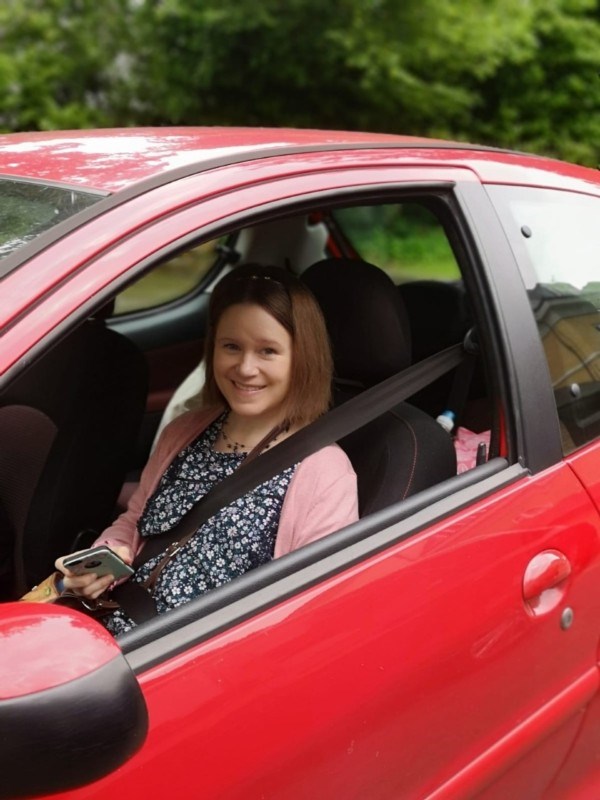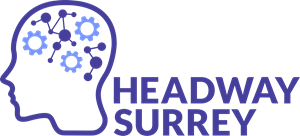
Lou - Her Story
Lou talks to Rachel Higgins
Lou, pictured here with her mother and sister, has been with Headway Surrey since 2019. Prior to the first lockdown in March 2020, she attended the centre in person and now continues her sessions via Zoom.
We thought it would be a good idea to interview her, to find out first-hand what it is like to live with an acquired brain injury and how important Headway Surrey is, in providing support on her rehabilitation journey.
Our very own Executive Assistant, Rachel Higgins set up a Question and Answer session in February 2021 and here is what Lou said:
Q: How long ago did you have your brain injury and how did you come to join Headway Surrey?
Lou answered: I had my stroke at the end of 2018. I was in hospital from 2018 to 2019. In April 2019 I came out of hospital.
It was Mum’s idea for me to come to Headway Surrey as she noticed me struggling with concentration and unable to focus attention on conversation. Mum works at the Citizen Advice Bureau and had seen a leaflet.
In May 2019 Mum took me for an information day at Headway Surrey and I chatted to Jo there. I agreed to meet with Jo the following week and then I registered.
"It’s sealed in my mind, 22 May 2019, that’s the day I joined Headway Surrey. I don’t remember much but that I do remember!"
It was great to meet Jo, as she was able to explain to me what Headway Surrey is all about. My stroke left me very disabled. I am disabled down my left side and I cannot use my hand or arm on that side, and I walk with a stick.
Jo explained Headway Surrey is about cognitive rehabilitation, about your thinking, planning and organising and getting on with your day in a way that is more organised and to live your life in a way in which you are more in control.
Thinking back to it, that means a lot to me now, but back then I was focused on physical rehab.”
My mum was the one who saw that I was struggling cognitively, and I was surprised to learn that there was support that could help me in that way.
“I remember back to the first few months after my stroke, and I was able to describe the brain fog that I get. It makes it feel like it is hard to get on and get anything down, because there is a mess in my brain. It stops me doing things.”
I still suffer from this but the learning I have done with HS is getting in there and breaking through the fog. I have learnt techniques to break through it and get on with my life, so my life is more organised and controlled.
Q: What sessions do you attend at Headway Surrey?
Lou answered: I join the cognitive workshop sessions on a Tuesday every week with Jo. Recently we have been learning about managing your emotions and getting in touch with feelings, and the way your body responds to emotions. At first I found it really difficult to get my head around this topic.
"Jo challenged us to understand what we are feeling and to see what it is doing to our body, and to use that understanding to get in touch with our feelings."
I see a psychologist every week for my brain injury, and he is also encouraging me to pay attention to my body and feelings. And when there is something that gives me a sudden negative response like shouting or getting angry, that I should try to understand and pay attention to what feeling, or emotion provoked that. I am using the emotion work from the cognitive sessions to try and help me get in control of my emotions.
One session I particularly love is the Art workshop with Rowena. We are a bunch of friends in that group.
“I see art as a session with a group of friends doing drawing and painting together."
"Rowena is a great teacher, and she keeps things light, relaxing and informal.”
I send my art to my friends and family and get so much positive feedback.
I like the Wednesday Coffee morning, and when there have been new members, the staff encourage us to talk about our experiences, and what we go through and the strategies we use. We build up peer support as we have similar issues. Few of the things people say you suddenly feel, I feel that too!”
I spoke about my brain fog and my struggles in the morning and trying to get myself into my morning routine, so I am ready for things I must be ready and organised for. So, I shared how I massively rely on routine in the morning and I explained it, and the group’s members started to say how much they need something like it. Since having the stroke this is something I have learnt to do.
“I feel like we are in a similar situation and going through the same challenges, so we share our strategies. This is something I have got a lot out of from the Coffee Mornings recently.”
I’ve been involved with Headway Surrey for a long time and they have supported me so I feel that I want to give something back, and if helping other people is one of those ways I can give back, then I will always be keen to do it.
Q: Has there been anything in the brain injury education sessions that you have been able to use in your everyday life?
Lou answered: I am a believer in learning by doing. The power of the list, writing notes to self, organisational strategies, notebooks. Every day I start a new page in my notebook. I use the iPhone facility to write notes.
Every evening I sit down and write an entire list, almost like a commentary about what it is I will do tomorrow, starting with what time I am going to get up, and what time I am going to have my breakfast, what I am going to do and where I need to go. What time I need to sit at my desk for my meeting.
“I write instructions for myself. I keep lists. I make check lists. I write shopping lists. I remember being encouraged to do this in the workshops.”
We’ve been given notebooks and if I need another one, Headway Surrey will send me one. I am so grateful for the resources they have given me. Things like notebooks are so important to people like me who need to get organised.”
I remember in the first few months after my stroke and being in hospital, I remember lying in bed and someone would come at mealtimes and put me in a wheelchair to take me to dinner. Once I was home, I would lie on the sofa and listen to the radio, I would manage to shower myself but that would tire me out and I would spend the day on the sofa. I was bored, I was fed up with the radio and I was fed up I was not doing anything. Going to the centre has helped to focus my mind and has encourage me to do things each day.
“During lockdown having something to do each day is almost like having meetings, and I then have things to put in my diary and give me structure to my life. It gives me something to be doing and something in my life. It has given me something to get up for every day.”
Q: What do your family think about you attending HS?
Lou answered:
“You know that my mum is a big Headway Surrey fan!”
She wrote, 'Going to Headway Surrey has helped Lou to learn many skills to help manage her life, in particular things like organising, planning, sequencing. She has benefitted from the art group and gained confidence in this area. She has always enjoyed art and crafts, but there is so much she cannot do since her stroke, so it has been really useful to develop this skill. She also benefits a great deal from the social contact. She has always been a sociable person, so the ongoing contact during lockdown has been very helpful.'
"Lockdown can be very socially isolating for anyone but particularly for someone with a brain injury. I work from home, I live alone, and being home most of the day, it can be isolating and difficult not coming into contact with people."
Through Headway Surrey I have made quite a few friends.
Q: What's it like returning to work
Lou answered: I was off work for a year. I had my stroke after a day at work.
One of my main priorities on joining Headway Surrey was to help me get organised. I joined a swimming club and wanted help with the planning and logistics of going swimming and having all the things I needed for it. If you have a brain injury, making sure you have all the things you need for swimming is so hard, and when you get out of the pool, especially when you are in a brain fog after coming out of the pool, and you are so hungry from swimming. I got help with writing my list and packing my bag for swimming and getting organised, and the routine of getting changed after swimming.
After I had conquered that then I asked for support in returning to my work as a civil servant. It was important to me to return to work and have an income, return to the world of work, contribute something, and have a routine. I arranged a meeting with my line manager and started the back to work process. Headway Surrey supported me with these meetings. I thought about what I could contribute and how many hours I could manage. I decided a couple of hours a week was all I could commit to. I thought I would need to commit to a nine to five job, but they helped me to understand I could consider less and more limited hours. I can work some hours and not lose my PIP support. When I did return to work, I was able to work from home, especially as physically I am unable to commute.
“I am really grateful for the help I have had from Headway Surrey. Looking at it in three ways they have helped me. First way, the strategies to overcome brain fog and manage my life. Second way, to not be socially isolated pandemic or not, as just having a brain injury can be isolating. Third way, to structure my life and have social support including helping in my return back to work.”
I am a great supporter of Headway Surrey and want to help and contribute in whatever way I can.
Have a story to tell?
How you can Help Us
Donate to Headway Surrey
We rely on voluntary donations to continue to provide vital services to brain injury survivors and their families. There are many ways to make a donation
Fundraising
It is surprisingly easy to help raise funding for Headway Surrey.

